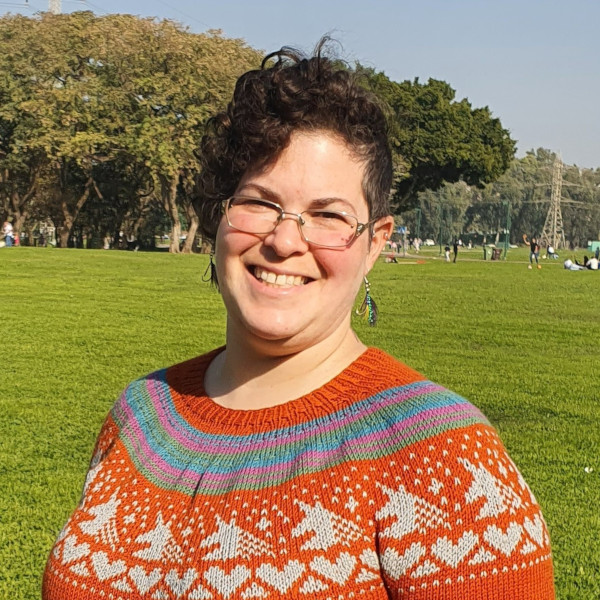Interviews with Olim
Each month, we interview an oleh or olah for our newsletter.
We invite you to read the stories of LGBTQ+ people who have made Israel their home.
"I felt for the first time in my life that I was home."
Interview date: March 2022
Q. Where were you born and where did you grow up?
A. I grew up in Brooklyn, NY in the heart of the Chabad community.
Q. At what age did you come out? And how did it go?
A. I started thinking that I might be different around 10th grade (around 16 years old), but I didn’t really know what queer or lesbian was. All I was told was that it was something bad and a bad word. When I started having feelings towards a friend of mine, I remembered being attracted to females in the past, but not understanding what it was. I told my religious therapist about these feelings. Her response was ‘If you don’t touch women, you won’t become a lesbian’. This sent me into a downward spiral about my identity for years.
When I finally had the courage to come out to my mother she told me, ‘You just never had a healthy relationship with a man.’ This was true, but by then I felt I knew who I was attracted to. My father used to ask me when I was going to get married and settle down. I finally had to ask him to stop, because he wouldn’t hear me out. Many years later when I was moving in with my then girlfriend I called him to tell him. He responded, ‘I don’t want to have anything to do with it and this situation’.
Since then my parents have come such a long way. They no longer think it’s a phase or something I’m doing to stand out. Changes in my life are new to them, like the concept of marrying someone of the same sex, but they take time and come around. This has meant so much to me.
Q. Were you involved at all in the LGBT community back home?
A. When I finally felt comfortable being myself and allowed myself to be open and meet other people like me I got involved in Jewish Queer Youth (JQY). I would go to the monthly meetings and march in Pride with them along with Congregation Beit Simhat Torah (CBST). My ex and I would go almost every Friday night to services at CBST. I starting working at a lesbian party line once a month. I made lots of queer friends and my life changed.
Q. What is your involvement (if any) in the LGBT community in Israel?
A. When I first made aliyah I lived in Eilat for about 5 months. When I moved up to Jerusalem I didn’t really have any friends. I really wanted to meet people and maybe meet ‘the one’. I started volunteering at the Jerusalem Open House. I volunteered for their “Shebentz” program. This took place on Saturday night and it was a place for queer teens to have a safe space to hang out. It was really nice. I met all types of people, but didn’t 100% connect with them or the staff. I did get involved in volunteering at Jerusalem Pride, but only for two parades.
In 2016, some women in Jerusalem got together and started Shabbat Shelach. I went to their first Friday night dinner, but then we moved to America temporarily so I didn’t have time to get involved. We planned to when we moved back to Israel, but then Covid happened. Another way I’m involved here now is that I’m a tour guide and I have guided LGBT Birthright trips. This is always an experience.
Q. How long since you made Aliyah?
A. I made Aliyah on December 19, 2011. I landed in Israel on the 1st night of Chanukah. I refer to my Aliyah as my Chanukah miracle.
Q. Did you move here on your own or with family/friends/significant other?
A. I made Aliyah alone with three suitcases and $700 in my pocket.
Q. Why did you make Aliyah?
A. When I tell this story I always think it sounds so cheesy. When I was 16 I came here on a summer trip. When we landed (in the old airport terminal) I got off the plane onto the tarmac and I felt for the first time in my life that I was home. At that time I was going through a lot. It took me 11 years and working really hard to get my life together. One thing that didn’t change was that feeling that I felt at 16. I cried almost my whole flight here and some days I still can’t believe that I get to live here.
Q. How is it going so far?
A. It was really tough in the beginning. When I made Aliyah I moved to Eilat and became a housekeeper. It was one of the most awful periods in my life. I finally saved up some money and moved up to Jerusalem. When you make Aliyah they tell you it takes about 3 years to acclimate. I gave myself those 3 years. They were not the easiest. I didn’t love my job, I had a hard time making friends and had a hard time connecting with the Israeli queer community.
After almost 3 years, things started to fall into place. I was finally able to take the ‘two Chavas’ and make them one. I applied and got into tour guide school, started dating someone and found an Anglo community. Things started to look up. We had to move to America for 3.5 years for my wife to do her post doc. I flew back and forth during the high tourist season to guide. Since coming back I can say that I’m in the best place and the happiest I have ever been.
Q. What do you do in terms of work?
A. I’m now a tour guide all over Israel and in some of the Palestinian areas as well. I guide all types of people from all over the world and all religious spectrums. From evangelical Christians to Orthodox Jews to atheists and people questioning.
Q. How is your Ivrit?
A. I would say my talking is pretty good, but my reading is less. This is why I married an Israeli…
Q. What has been your biggest challenge so far?
A. The first 3 years were challenging – finding where I belong. Now it’s been Covid. I went from working full time to being at home 99% of the time.
Some of the medical stuff is a challenge too. I wish there was a way to be more informed about what is the best way to navigate it.
Some of the rudeness and the driving. It’s like no one else is walking in the place you’re walking. With driving, it’s like the laws are suggestions and the horns are automatic. I wish I could campaign to swap horns for turn signals.
Q. How do you perceive the Israeli LGBT community?
A. I’m not really too involved in the Israeli LGBT community. We moved back here right before Covid and moved to Jerusalem during Covid. I guided an LGBT Birthright trip and I took them to Pride. I like to go to Jerusalem Pride, because it’s smaller and more of a protest. With some of the LGBT people in Israel I feel like we share different ideologies, and that’s hard for me. For me, Tel Aviv Pride is too hot and very male-focused. I had the opportunity to go to the first Pride in Rechovot. That was a really great experience too. Now we hang a rainbow flag out our window and just live life.
Q. How is being LGBT in Israel different to back home?
A. In America, I felt that I had to keep my life living at my parents separate from my LGBT life. After moving here, I was able to merge into one person. In Jerusalem it’s harder to be out holding hands with my wife. In Tel Aviv its easier. In certain places and times we have to be more conscious here than we were there. Here I have been discriminated against by potential roommates who don’t want to live with a lesbian, to someone not wanting to rent us an apartment as a couple. We have had a photographer turn us down because of religious ideals. Because we live in a country where religion is really a big deal, it’s a bit harder.
Q. If you were making Aliyah now, would you do anything differently?
A. Yes. I would definitely pack very differently. A few months before I made aliyah my parents came and I sent them with a suitcase of art supplies. I would have sent them with clothing and books. Other than that, I needed to go through everything I went through to get to where I am today.
Chava

Our Newsletter
Sign up if you would like to receive a monthly email listing events of interest to LGBT English-speakers in Israel, an interview with an oleh/olah and other useful information.
Want to be interviewed?
Complete the form below and we will get back to you.
Our Newsletter
Sign up if you would like to receive a monthly email listing events of interest to LGBT English-speakers in Israel, an interview with an oleh/olah and other useful information.
Want to be interviewed?
Complete the form below and we will get back to you.


